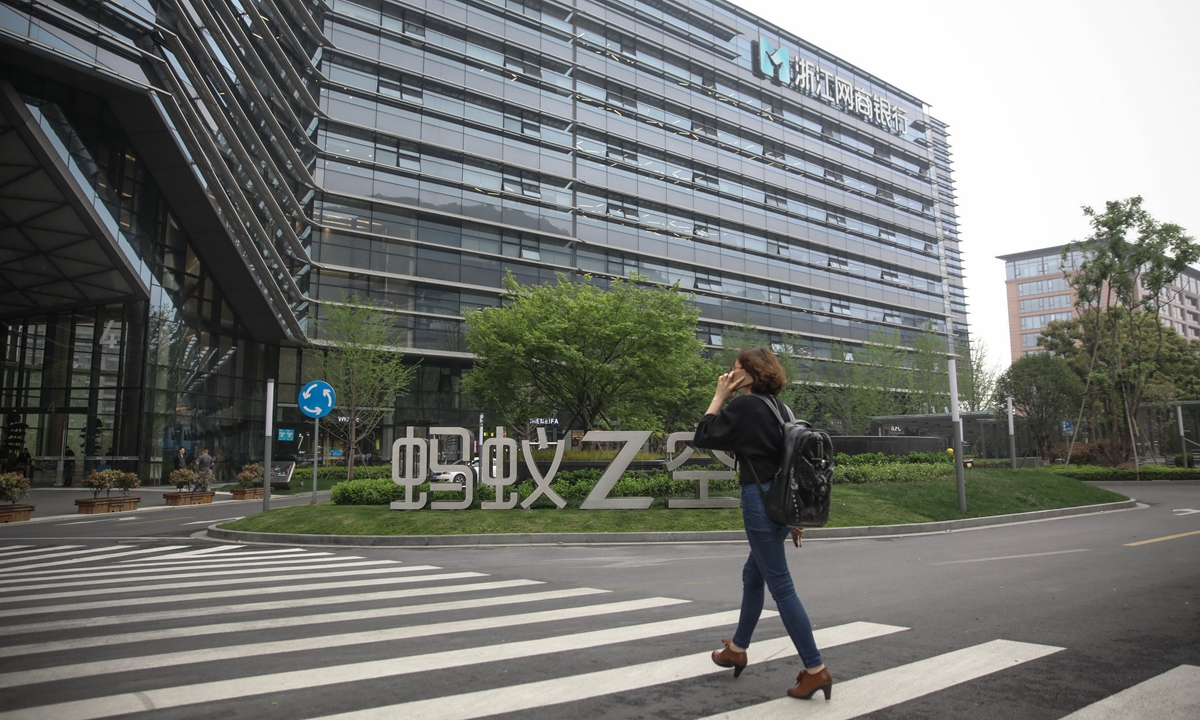US move against Ant won’t be big blow
By Li Xuanmin in Shenzhen Source: Global Times Published: 2020/10/15 15:53:02
Technology firms hike R&D, adjust overseas strategy in response

File photo: A person walks towards a building of Alibaba Ant Group in Hangzhou, East China's Zhejiang Province in April 2018. Photo: IC
After months-long tech war the US waged against the China, Chinese tech entrepreneurs have not regarding malicious assault from the US government a big matter, with more taking a "wait-and-see" attitude on whether the claimed US restrictions will merely be a bluff or are impactful, the Global Times learned.
The latest example is Alibaba's financial arm Ant Group, which is reportedly under the consideration of the Trump administration on whether to be added to the US government's trade blacklist. A listing could make it more difficult for the world's leading fin-tech giant to source items from some US suppliers.
The Reuters said it was not clear when the US government agencies that decide whether to add a company to the so-called Entity List would review the matter.
The potential ban has not led to a big buzz in Chinese technology circles, with most of the entrepreneurs saying that they're "not surprised at all", as the Trump administration is set to assault Chinese technology companies.
"This is like a wolf story. We might have panicked last year as we rarely experienced such an attack at that time. But now our focus has shifted to whether Washington's words of threat could translate to genuine restrictive measures," a manager of a Shenzhen-based electronic start-up, who spoke on condition of anonymity, told the Global Times on Thursday.
Ant Group declined to comment when reached by the Global Times. But a source close to the matter told the Global Times on condition of anonymity that as the Ant Group's payment platform doesn't use any services and major parts from the US, so the impact of a ban is "significantly limited."
"There is no legal basis for putting Ant Group into the US blacklist. It seems to be like an eye-catching 'balloon bomb' thrown by some US politicians to score political points ahead of the presidential election in November," the source added.
According to Ant's IPO prospectus, the company gets less than 5 percent of its revenue from outside China.
The reports of restrictive measures come ahead of Ant Group's slated dual IPOs at Hong Kong stock market and Shanghai's STAR market in October. The listing, which could be worth up to $35 billion, will be the world's largest initial public offering to date.
The source said that the group is proceeding with the IPOs "as planned."
In Shenzhen - dubbed as China's Silicon Valley, people are sarcastic that all the companies being targeted by the US government are, actually, leading Chinese high-tech firms that own key technological innovations, and should be respected.
"We have reached a consensus that for most of the time, the US is playing the trick of bullying and blackmailing to get 'the best price' out of all. This is something Chinese tech players would never accept," a spokesperson from Shenzhen-based drone-maker DJI surnamed Xie told the Global Times.
Washington has hardened its assault on Chinese technology companies. Since the beginning of 2020, it has targeted a slew of Chinese tech firms, including Huawei, Wechat and TikTok, in the name of so-called "its national security".
To counter US' mounting pressure, Chinese companies have been inspired to scale up research and development efforts in order to become leading players on key tech fronts, Xie said.
Such sense of urgency is also on vivid display at Shenzhen's Yue Hai Street that is home to big name tech behemoths including Tencent, ZTE, DJI and Skyworth Group. Office lights were on late Wednesday night and employees have been working long hours at their positions.
Meanwhile, some Chinese companies have also adapted their overseas strategy so as to get prepared for the uncertainty.
Ratcheting up lobbying efforts or uniting with local shareholders in the US have become an option, as the case of a local US court overruling an executive order on the appeal of US Wechat Users Alliance shed light on the power of mobilizing local partners, according to Xie.
An executive of a local TV-company in Shenzhen told the Global Times on condition of anonymity that the firm had voluntarily frozen its business in the US over "geopolitical concerns." The company has also begun sourcing chips from South Korean and Japanese suppliers instead of the US after Washington's wicked move to curb China's tech rise.
"We've endured many hardships in our years of company development and growth, and this time is no exception," the executive said.
China's Foreign Ministry said on Thursday that it strongly objects to the US' bullying practice that generalizes the concept of national security and abuses state power to crack down on foreign firms.
"China will continue to take necessary measures to protect the legitimate interests of Chinese firms," Foreign Ministry spokesperson Zhao Lijian said, while urging the US to respect the principles of the market economy and fair competition, and to provide an open, fair, just and non-discriminatory business environment for foreign companies in the US.
Posted in: COMPANIES